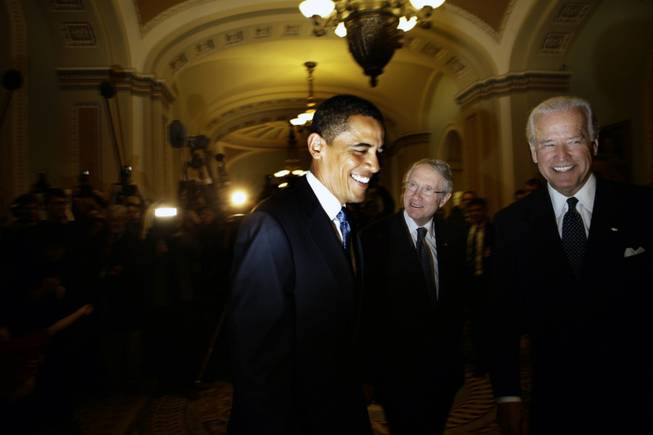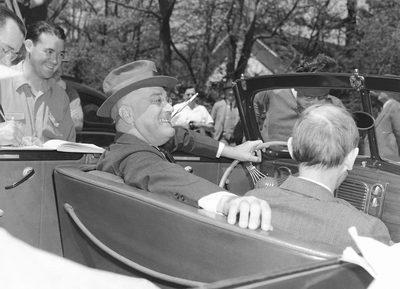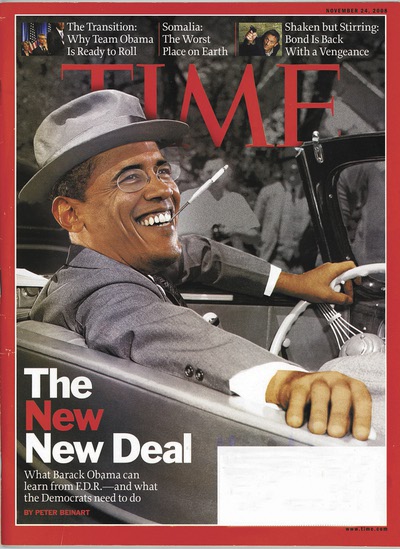
Doug Mills / The New York Times
President-elect Barack Obama, from left, Senate Majority Leader Harry Reid of Nevada and Vice President-elect Joe Biden share a light moment this week on Capitol Hill. To advance his economic agenda, Obama will have to go through Reid, who lately has been indicating that he’ll be no pushover, emphasizing the Senate’s authority.
Friday, Jan. 9, 2009 | 2 a.m.
As the nation waits for Washington to find a way to fix the economy, two things are certain: The initials FDR are on everyone’s lips, and Sen. Harry Reid has the toughest job in town.
If President-elect Barack Obama’s economic agenda falters, it will be in the Senate, where Reid manages a precarious majority.
Franklin Roosevelt and the then-leader of the Senate found themselves in a much stronger position 75 years ago as they tried to dig the nation out from the Great Depression, says Adam Cohen, author of the coming book “Nothing to Fear: FDR’s Inner Circle and the Hundred Days That Created Modern America.”
Back then, FDR’s sheer power rendered Senate Majority Leader Joseph T. Robinson of Arkansas almost a nonentity. What’s more, Democrats not only held bigger majorities in Congress, but the nation’s mood was so desperate that Republicans eagerly signed on to the FDR agenda.
Looking back wistfully, today’s Democrats have turned FDR into a verb synonymous with forceful action. Cohen says Reid will indeed have a large role in determining whether Obama can FDR the economy. Also, the Nevadan has lately been emphasizing the Senate’s independence from the White House, indicating that if Obama FDRs the economy, he won’t do it riding an FDR-era steamroller.
We asked Cohen, assistant editor of the New York Times editorial page, to compare Washington then and now as Reid and a new president embark on their grand plan.
People are calling for Obama to be as bold as FDR in dealing with the economy, but are the conditions similar enough for him to pull it off?
Well, although times are very tough now, they are not as bad as when FDR took office. In 1933, the entire banking system had closed down and unemployment was at 25 percent. Conditions were dire and turning things around wasn’t easy. Obama is lucky things aren’t as bad as they were then. But that also means he won’t get as much blind support as FDR got.
Meaning Congress will be a challenge for Obama when it wasn’t for FDR?
In FDR’s time Congress was very supportive, even compliant. The country was doing so badly that even Republicans didn’t want to stand in the way. Their mind-set was: Whatever the president wants, we’re going to support. There was a lot of deference to FDR. Obama won’t have that. He has to worry about Republicans blocking legislation.
Does that put pressure on Reid to be more of a prominent player than Robinson was?
Yes. Reid will play a key, key role in the coming months. Robinson was more an implementer of what FDR wanted. I think Reid will have a more delicate role to play, balancing the demands of senators with the president’s goals. Much of his importance will rest in making sure there are 60 votes in the Senate to get things through. It’s going to take a good deal of political skill.
Will it help Reid if he looks back?
Appealing to the spirit of 1933 is powerful. He can speak about what can be achieved when Congress supports the president and works in a united fashion. Reid can paint a picture where it would be bad for Republicans to be viewed by the American public as obstructionists.
Reid recently remarked about how things will run smoothly as long as Obama remembers the Senate majority leader isn’t subservient. But it sounds like Robinson wasn’t as territorial about power.
FDR was almost his own majority leader. He had a lot of personal interaction with Congress. He would bring leaders to the White House and talk to them individually, persuading them to fall in line. FDR was very good at massaging Congress to get what he wanted. It was a great strategy. Personal charm from the president went a long way.
Did the public look to Robinson or the rest of Congress to be leaders?
The real focus was on the president. He was the most prominent figure in ushering in the New Deal. The country was so eager to support FDR, to have him be free to implement his program, that people didn’t want Congress to stand up too much. Even Republicans heard from constituents instructing them to give FDR what he wanted.
It seems unlikely Congress would be so passive these days.
We have a much more independent minded Congress now. There is more access to the media and with that comes more criticism of the president before he even takes office. FDR had a halo around him for so long, he was able to use his sheer personality and charisma to get his way without much help. That’s not to say Congress didn’t ever stand up to him. FDR was opposed to instituting the Federal Deposit Insurance Corporation, because he thought it would force strong banks to bail out weak banks. But Congress insisted and got it included in the second banking bill. It’s now regarded as one of the best things to come out of the New Deal.
How did the New Deal take shape?
Although people don’t realize it now, FDR was very undecided on how to approach the Depression when he took office. He believed in a balanced budget and had to come around to the idea that the government had to spend a lot of money to combat the Depression. Obama is starting very early and with an understanding there’s a need for heavy spending.
If Congress wasn’t playing a large role, then who persuaded FDR to come to that conclusion?
One lesson from FDR’s presidency is just how important Cabinet members are. They were the ones who really fought for such things as the Federal Emergency Relief Act. Ultimately the New Deal came down to what people were able to bring to FDR, and convincing him of the programs’ merits. It was very chaotic. One example: Harry Hopkins had the idea for federal welfare and he got on a train for Washington. He ended up selling it to Labor Secretary Frances Perkins, who took it to the president. His inner circle was also often emissaries for him and were very helpful in persuading Congress to pass key New Deal legislation.
In the very beginning of FDR’s term, in ’33, the first banking bill passed in one afternoon. How was that possible? Robinson must have been effective in his job even if FDR was the impetus.
Robinson was able to whip things into shape. In 100 days he got 15 major bills passed. He was working in the president’s name, and Congress at that time was almost too deferential to FDR. They passed that bill without literally seeing one word of it. But every bank in the country had closed and people were desperate. It would be great if Reid and House Majority Leader Nancy Pelosi can turn Congress into that kind of well-oiled machine to get things passed quickly.




Join the Discussion:
Check this out for a full explanation of our conversion to the LiveFyre commenting system and instructions on how to sign up for an account.
Full comments policy